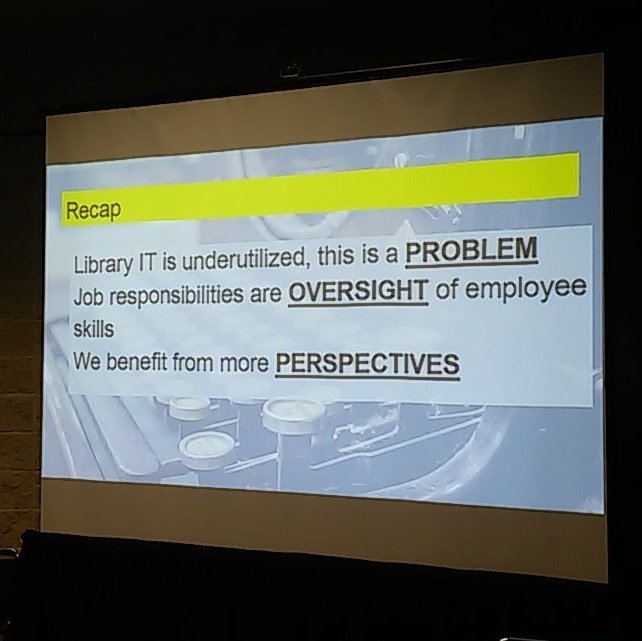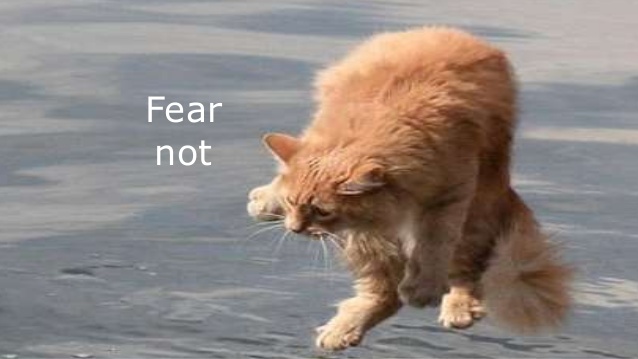callan \ blog
july 4, 2016
I broke my streak of posting something every Sunday last week, but I have an excuse: I was at the American Library Association's Annual Conference in Orlando.
Let me take a moment here to point out I'm still new to the profession, and still practically embryonic when it comes to professional development of any kind. My job has many perks, but right now there is no budget for any conference registration or travel outside of the state. I lucked out for ALA's Midwinter Meeting in January (it was in Boston) and made the most of it: lots of networking, attending sessions, and joining a division (LITA - that's the Library Information Technology Association, for the acronym-weary non-librar* among ye) and a task force. One of my library fairy godmothers noticed me having a blast at Midwinter and offered half her hotel room for Annual. I graciously accepted; we firmed up our plans at the beginning of spring and made it happen.
As is my wont, I did some egregious livetweeting of the sessions I attended. Instead of recounting everything I got up to down there, I figure a post would be better spent compiling and analyzing some of the main lessons and ideas I flew away with on Tuesday morning. So here goes.
Empathy. Where've we heard this one before? Oh that's right, kinda everywhere - but there's no way to overstate the importance of empathy in all that we do. "The key to making things understandable is to understand what it's like to not understand," the author-architect-designer Richard Saul Wurman once said. It's human nature to lose sight of this; Lorcan Dempsey's recent post "Libraries and the curse of knowledge" digs into why this is such a problem for us - libraries are traditionally curated and maintained by people who love libraries ("by nerds for meta-nerds"). Which brings me to the fact that...
It's OK for us to not always be experts. Are you an expert on every single question a patron or student or coworker asks you? (Former Jeopardy champions, please omit your response here.) Of course you're not, because you're a human person with a human brain and a human mental capacity. When we introduce ourselves to non-library people, I'd bet many of us tack on a variant of the tried-and-true "I don't know much, but I do know where to look it up!" We are OK with applying this to reference work, but we need to take it many steps further than the reference desk.
I'm encouraged by stories I hear about libraries acquiring new gadgets like 3D printers, laser cutters, VR gear, etc. learning and muddling through how to use them right alongside their patrons. As a library web person, I'm regularly asked questions about software and tools that have little to nothing to do with my actual job responsibilities (printers, email, Microsoft Publisher templates...yeah, don't judge us). I have no clue offhand how to get Word to remove those pesky extra blank pages you sometimes wind up with at the end of a document. Instead of telling a panicked colleague to just Google it and leave me alone, I sit down with them and wander around the web until we find an answer and fix it together. It's a nice reprieve from biting my nails in fear of PHP errors.
When I need to remind myself what empathy is - and that it's not just commiserating - I listen to Brené.
Siloing and "over-departmentalization" needs to stop. And we should really get some folks from industries and sectors outside our own to speak or present at conference. Why do we categorize ourselves so rigidly? I mean, aside from the whole "we're librarians and we're shyyyyyy" thing. But why do we keep IT people or the web team at arm's length from the rest of staff? This sets us up to get little buy-in from stakeholders, since we're regularly coming to them with "solutions" they had no say in to problems they may not have ever identified.
Also, one of the things I like best about conferences is that I get to hang with people who I'd never normally encounter in my work as a web developer at a state agency - catalogers and archivists; knowledge management and copyright folks; advisors for children's and YA services; specialized vendors; publishers and authors. I love talking to these people about what they do, comparing and contrasting their experiences with my own, seeing where we can potentially overlap. We're stronger together, as my buds at the Massachusetts Library System would tell ya.
And about that professional introversion we suffer from so: Why is there nobody from the web, software, or other computing giants at these conferences? I keep thinking with all the coverage of Apple's allegiance to privacy, we could have an ally of sorts on that front - and I won't touch a toe into the pool of linked data, which must already have search engine architects and natural language processing people chomping at the bit, right? (Correct me if I'm wrong here - I'm just a wee script jockey, not much of a metadata lady.)

Slide from "Library IT: Information Technologists or Information Thought-Leaders?" presentation on Sunday morning.
We all should call out microaggressions, bias, stereotyping, and similar problems that plague our profession when we see them - or at least, find jobs in places where management does this (or otherwise prioritizes making strides in this direction). The "Women in Library Technology Leadership" panel was a showstopper. It was harrowing to hear the panelists' experiences with discrimination and related harassment on the job, along with the brave, angry souls in the audience who shared their own stories.
The importance of mentors and self-aware, supportive management came up again and again. "As women, our ideas often get attributed to others. As a manager, I correct that and give ideas back in the moment," said panelist Karen Estlund, an associate dean at Penn State Libraries. She also mentioned her decision to buy space heaters for the women in her drafty department, a kind gesture acknowledging the oft-dismissed value of physical comfort on the job. It was also good to hear us reminding each other that sometimes you really do have to stop trying to make the best of a bad situation, and there's no sense in taking that out on oneself. I know we struggle with this all too often, committed as we are to our quest of not letting people down (even when the people in question happen to be treating us like roadkill).
We must be bold and confident when we talk about how awesome and valuable libraries are. Stop apologizing for or dialing down your passion. Not too much more to say about this, other than I know I'm regularly guilty of belittling not only the importance of what we do but also my own love of doing it. We can't be "a profession of Bridget Joneses," as one of my colleagues once put it, and not expect to be trampled or ignored.
Patron privacy is being discussed far and wide, but there's no consensus as to how we can rally around protecting it (or whether or not we should still be so concerned with it at all). The discussions I heard on privacy ranged from the NISO event on its impact on and relationship to user experience to a flippant comment during LITA's Top Tech Trends panel that "privacy is dead" (cringe, cringe, cringe). There's a big inconsistency in tone and priorities, it would seem. I'm trying to see both sides on this one, but I have to admit I'm getting very tired of the argument that privacy is already so undermined by people's day-to-day Internet use that we should just let it go and join in the dismantling. During the NISO session, somebody proposed an ALA-sponsored privacy summit, bringing librarians and vendors together on the issue; that seems like it could be one step in the right direction.
I would encourage my colleagues who think "privacy is dead" and that they have "nothing to hide" to consider the perspectives of underprivileged people who are disproportionately targeted by physical and online surveillance; activists and undercover journalists who are doing personally dangerous work for the benefit of society; victims of harassment, violence, or abuse who seek respite from their tormentors; writers or artists who take on controversial topics and need to do research without the fear of a national security letter or laptop confiscation. Or, y'know, they could just remove all the blinds on their windows, start leaving the house naked, and tell me their social security numbers and ATM pins.
We can be (and, imho, should be) data therapists, digital sherpas, monitors of algorithms, protectors of the public from the sticky, inscrutable fingers of big tech monopolies - what Alison Macrina of the Library Freedom Project once called "the granola store in a world of candy stores." These are (mostly) words straight out of the invigorating call-to-arms that drew a standing room only crowd to Lee Rainie's Pew library trends report on Monday afternoon.
I'm going to take it one step further and outright say librarians are well positioned to be the antagonists of, or at least the sustainable alternatives to, Internet giants; the fly in Google's algorithmic ointment, the sworn defenders of the unpaid/underpaid content laborers of social media, the "third place" businesses like Capital One and Barnes & Noble have so vainly tried to be. We care about privacy, equitable access, informed decision-making; we can be information churches, the unpaved, unquantifiable paths of serendipitous browsing and community building.
I keep going back to Chris Bourg's description at MIT's panel on the future of libraries back in February, of how physical libraries give us a sense of place, an actual playground or study space for connection-making and collaboration in a time that can feel so unyieldingly disembodied:
Bourg used the recent discovery of gravitational waves to construct a metaphor for what libraries do today. She paraphrased a scientist who described black holes colliding and making a "whoosh" sound, not unlike a household vacuum. The tangibility of that description, she said, is akin to the library providing a physical space for understanding and interaction in our increasingly abstract, digitally-mediated lives.
So, bottom line: I feel like we've got such gleaming potentiality before us as a profession, even as we fend off austerity, anti-intellectualism, and competition with everybody from Starbucks to Google to Apple to Facebook to Netflix and beyond. I'm so glad I had the chance to come to conference and pop myself out of the Massachusetts library bubble, just for a little bit. I feel inspired, reenergized, and ready to rattle some cages.
I'll leave you with some parting advice from Mr. Rainie.

home | top
Hey Cal, why is there no comments section? Comments sections have a tendency to devolve into nasty little spaces, teeming with spam & ad hominem attacks. I also have a fondness for the 1.0 Web (props to Neocities, powerer of this site). If you'd like to share your thoughts, find me on Twitter or fire off an email. Thanks!